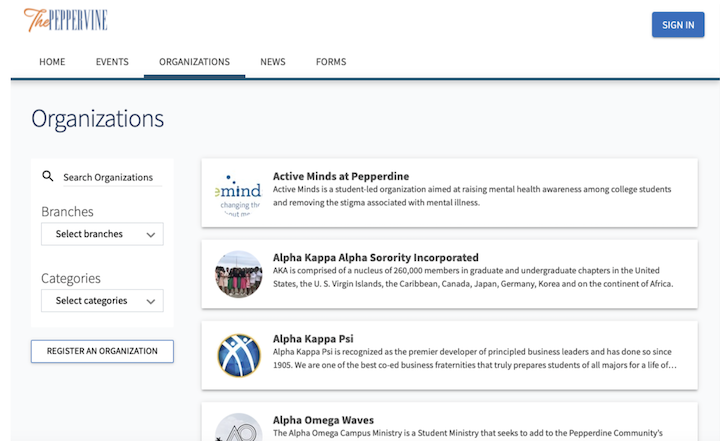
Pepperdine’s Inter-Club Council funds almost all clubs on campus and controls which ones are created.
This five-person council is in charge of student money through the Campus Life Fee. The council allocates these funds to clubs on campus through a screening process, and requires training for all club leaders every year on policies and protocol. While the ICC’s main role is to support clubs, student club leaders would like clearer communication and more transparency around policies.
“I’ve always looked at ICC as just the steward of the campus life fee,” said Jerry Calderon, ICC president and a senior political science and psychology major. “I’m making decisions on an executive level that furthers the vision and unity of our campus life and organizations.”
ICC supports 92 organizations and clubs on campus. The ICC is just one of many student engagement organizations on campus. Others include the Student Government Association, the Board, Panhellenic Council and the Inter-Fraternity Council.
What does ICC do? Pepperdine students pay the Campus Life fee at the beginning of every year. Currently sitting at $126 per student, the Board, Student Government Association, the Student Wellness Advisory Board and the ICC all receive funds from the Campus Life Fee, to collaborate toward building student community and engagement on campus.
The ICC establishes campus clubs, authorizes club funding requests and creates guidelines for organization operations.
“What we’re here to do it’s to really support clubs’ missions and visions,” ICC Advisor Sabrina Wilison said.
Wilison also meets with organizations that may need extra support or guidance.
“I meet with them monthly and set goals to help them ensure that they’re going to have a stronger foundation going into the next semester,” Wilison said.
College club involvement is beneficial to students for success, Ellie Bruner wrote in a 2019 academic journal. Clubs encourage achievement, encourage development professionally, give students a community for support and a place for social and academic advancement.
ICC utilizes the Peppervine domain to support coordination and further communication between clubs and the student body.
“We’ve had this tool since 2011 and we’re fully utilizing it to help with contact tracing,” Wilison said. “Who’s actually attending events and how we can help organizations really prosper and also trying to catch orgs whose [organizations] ebb & flow, giving them good foundations.”
Peppervine hosts information on all 92 organizations and information on events.

Student leaders like Inez Kim, junior integrated-marketing communication major and president of Delta Sigma Pi, one of Pepperdine’s professional business fraternities, said she would like to see ICC improve their communication. Leaders for BSA and the Green Team declined to be interviewed for this story. Audrey Lin, vice president of Finance for ICC, also declined to be interviewed.
Not all fun(d) and games
ICC distributes the campus life funds to clubs through funding requests, a funding assessment and board approval.
ICC mandates that at least two club members from each organization participate in leadership training the first Friday of each semester.
“They will learn how to use Peppervine, learn how to request rooms and spaces, they’ll also learn our policies on funding,” Wilison said.
Students have to pass an assessment after the training to ensure complete understanding. Students must score 80% or higher. That then gives their club access to funds, up to $7,000 for each organization.
“Every club is entitled to a general fund and a student development fund, which differs year to year,” Calderon said. “That doesn’t mean that every club is getting $7,000 — they just have up-to that access of funds.”
There are three categories for funding: general funds which are for events open to the general Pepperdine population to attend, student development funds which are funds for events that directly impact the development of club leaders or members, and promotional funds which are used for shirts, mugs, backpacks, sweatshirts, etc. Clubs must submit requests for these funds two weeks in advance of the funding meeting to be qualified, according to the ICC Manual.
The council votes on the requests according to a rubric for each category of funding.
“We will put a funding request up to the rubric to make sure that we’re remaining transparent but also remaining equitable to all of our organizations,” Calderon said.
ICC sends out approvals and denials. If denied, there are opportunities for representatives to come into the office during their workshops to further discuss the reasons for the funding, explain its importance, etc.
Since the executive board is composed of students, excluding Wilison, some students have raised concerns about what happens when board members are involved in the club under consideration. Calderon instituted a new rule this year that executive board members could not vote on those cases.
“I’ve been trying to improve transparency when it comes to funding meetings,” Calderon said.
Other universities have similar policies. The University of Southern California utilizes a system for clubs to request funds dubbed the funding branch. In a university club spending guidelines article, clubs have to make requests five weeks in advance and document attendance at each event.
Bridging the gap between students and the ICC
A typical Pepperdine undergrad student would not know about organizations like the ICC due to its lack of communication with the overall student body. Only those who are elected within their organizations to represent or coordinate events, or students looking to create a new club on campus, would be in contact with ICC, according to ICC’s manual and purpose.
Some students believe that ICC should be more well-known across campus. More than two representatives per club should have an understanding and awareness of the policies in place, students said.
“You have an office, you have a purpose, you have a mission as an office, and that should be known to students what you do,” said Ani Harutyunan, senior psychology major and vice president of Pepperdine Armenian Student Association. “I don’t know what you do.”
Kim said she was still foggy after a semester of working closely with ICC.
“Obviously there are times where I’m not exactly sure what they do,” Kim said. “I’m beginning to get a better understanding as I work with them a lot this semester, but I think being able to understand what they do would definitely help.”
Many involved in clubs have also hit unclear or unknown roadblocks with ICC’s policies, particularly in regard to COVID restrictions and what constitutes a ‘club’ event. “Any activity in which four or more members or new members of an organization are engaged may be considered an event of that organization and will be subject to all guidelines thereto pertaining,” according to the ICC manual.
With Pepperdine being such a small, close-knit community, establishing a four or more person quota for formal or informal gatherings constantly causes problems between ICC and the clubs, Harutyunan said.
“I think it’s absolutely ridiculous to have this rule,” Harutyunan said, “That, if there are four or more of you hanging out from the same club … that is considered an event and you must get that approved two weeks in advance and what sucks is, we find a home with these cultural clubs.”
Historically, school officials have used the four-or-more rule to enforce the dry campus, ensuring that clubs or Greek organizations won’t indulge in alcohol for fear of risking their club’s funds.
But now it has taken a new meaning with COVID.
Hartyunan said she received a warning from ICC after she had friends over to study, detailing the probationary rules for not formally seeking approval for an event and for not following Pepperdine COVID mask guidelines.
“The students are scared to hang out because we don’t want to get reported,” Harutyunan said. “But [sometimes] it’s just [that] we’re just friends. I had a few of us studying — that’s not an event that’s just us taking the same class.”
While ICC did not sanction the club, violation of the rules can have severe consequences. The first level of probation is termination of funds for the semester, according to the manual.
Since ICC oversees many different clubs, the guidelines for all may not be beneficial to some.
“Planning out events, it’s a very mundane process,” said Ibi Velasquez, senior major and vice president for Health, Wellness and Accountability for Alpha Phi. “I understand it’s that detailed for a reason, but if we’re just doing chapter, we don’t need to fill out this fat form for something so simple. I feel there could be better categories for Greek life.”
FULL ICC MANUAL DOC. ANNOTATED BELOW
Chloe Schlachter completed the reporting for this story in Jour 241 in Fall 2021 under the supervision of Dr. Christina Littlefield and Dr. Theresa de los Santos. Dr. Littlefield supervised the web version of the story.


